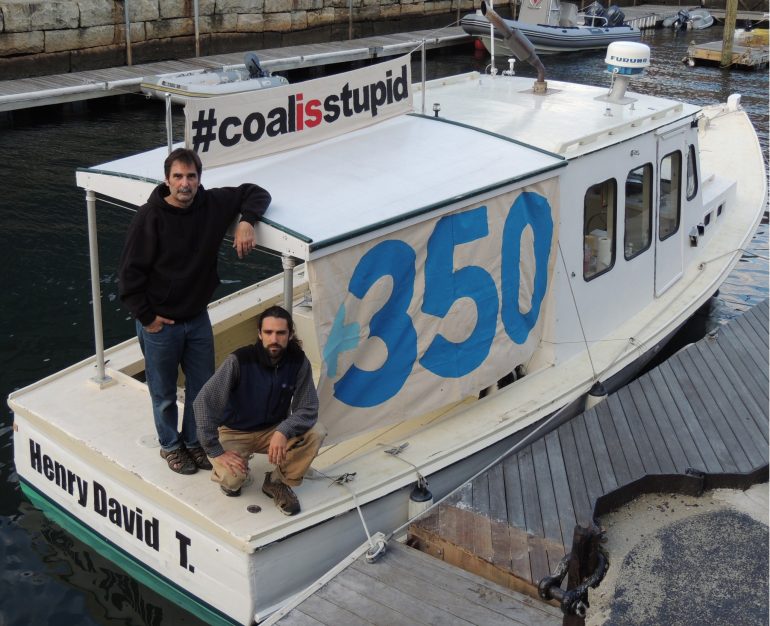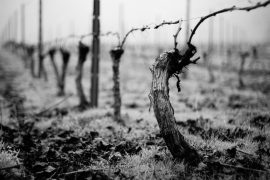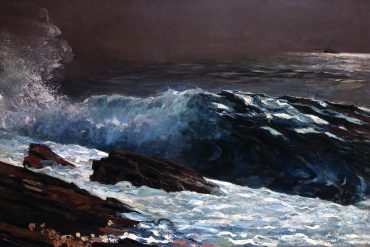On May 15, 2013, Jay O’Hara (member of the Religious Society of Friends, Quaker) and his friend Ken Ward (a Congregationalist) aboard their 32’ wooden lobster boat the Henry David T, blockaded 40,000 tons of Appalachian coal from being unloaded at the Brayton Point Power Station in Somerset, Massachusets, for over 10 hours. The pair are set to stand trial September 8 and 9, 2014 in Fall River, Massachusetts, on four state charges, calling Bill McKibben and Dr. James Hansen as expert witnesses. More information on the action and trial can be found at LobsterBoatBlockade.org. Jay is member of the New England Yearly Meeting (Quaker) Young Adult Friends Climate Working Group, and after the action had an extended conversation with fellow working group member Anna Barnett. The following is an excerpt of their conversation.
[capt]The lobster boat the Henry David T blocks access for a tanker ship with 40,000 tons of coal[/capt]Lindsay Metivier[all-rights]
[separator type=”thin”]
Listening at the Center
Jay: I’m going to start by saying that the number one thing is putting the still small voice at the center of my life, and trusting it, knowing that it is real and true and that it is more relevant and important than outside considerations of strategy or the “right thing to do”, it’s more important than any striving or hard work, it’s more important than crawling on my knees through the desert for a hundred miles repenting, because Mary Oliver is my…
Anna: Is your Prophet?
J: Mary Oliver is at least my touchstone theology. And so, then personal purification came from that, from a desire to make my life be more in harmony with the inward life that I have found. The inward liberation, the inward trust, the ability to let go of outward forms and expectations, and to focus on the real life, which is the real life in God, real life in the spirit or real life in the Light or real life in Christ. And make that the center. And then not owning a car and riding my bike all year round in New England becomes logical. Once you’ve done all that, you know that all those things are not the fullest expression, and I don’t want to say it’s not enough, it could be enough for some people, but for me it’s not the fullest expression the new world that I believe needs to… the new world that is coming. And I wanted to witness to that power and that injustice and to show in a concrete way or illustrate the moral conundrum or challenge that burning coal induces. And so to make that visceral, to put my body in the way of that process.
A: Let’s talk a bit about what it’s like for you to try to move that faithfulness, that listening to the center of your life. How has that evolved for you?
J: That’s really the question, isn’t it? This is where the words fail. This is where we come up against that which cannot be spoken. A profound clarity of rightness and joy. And usually preceded by several months of agony and questioning…I move into these times of clarity and vision after being really hemmed in, being really depressed, oppressed, small, and usually over busy stressed out and judgmental and obnoxious in the world.
A: Hah! And when you start to taste the clarity, what situations? Is during worship or…
J: No, it’s not during worship. It runs in longer time spans. It runs in times of weeks and months, and so the pivot always seems to be quitting something. Saying no to something. Being able to be discerning about what is and what is not my role. And that role gets clarified, the light penetrates my deep places of ego that are driving me to do these things that are stressful and unhelpful and make me judgmental and small.
A: Right
J: And quitting Climate Summer [a program for college students Jay founded in 2009] was my first big example of that where I just had to trust that if it was meant to go on it was meant to go on and it didn’t have to be mine to carry. And then a year ago now I quit the board of a climate organization that I was on as well as saying no to some Quaker entreaties to join committees and do that sort of thing.
A: This is fascinating because I feel your message could be instead of “Let’s all step up and do more activism” it’s “Do less activism”…It’s about the power of stopping doing activism. The power of doing less and listening more.
J: And that’s fundamentally the power of giving over control to the voice instead of giving control over your life to your ego or to the world’s expectations and just submitting totally. And in that submission finding grace and acceptance and clarity.
Submission
Anna: Yes, but I feel like in order to communicate with people we need to say: what does submission actually look like at the ground level, in day to day life. And part of what it looks like is quitting things.
Jay: Yeah. A lot of it looks like radically simplifying down so that you’re not doing a lot of things. I had a month of ecstasy last fall. Which I can almost not describe. It was after sailing in Maine for three weeks, which was a real challenge sailing with my partner at the time, but being disconnected, focused and also… It was hard, but it was also profound because she’s a profound deep listener and a good influence in encouraging my sitting and waiting and listening. I think the breakthroughs are only going to happen if you make that sitting in silence and listening a daily thing. I’ve been in the habit of trying to take five days a week in the morning and taking a half hour of sitting in prayer and meditation, and it is so helpful, so important.
I think one of the important things for me that comes of these times of prayer and meditation is the realization that doing climate action doesn’t have to be part of a burdensome process with thousands of hours of meetings and that I think we kind of get caught up in some leftist ideas of what activism is supposed to be like. Which I don’t think is necessarily the Quaker way.
The left claims that they borrowed Quaker this and that at times in process, but the real Quakerism is submitting to the voice. It’s not about consensus. And that’s the big thing, not everyone has to do the same thing. There’s a role for people who want to work on the boat, there’s a role for people who want to do media work, there’s a role for people who want to tweet things, there’s a role for people who want to hold you in prayer, there’s a role for those who want to make soup for those who can’t be there because they’re sick. Everyone’s got a role, you just have to figure out what yours is. And it was very clear what mine was, which was to be the guy who knows about boats and the local Cape Codder who spoke the ship radio language to the Coast Guard, and it’s almost as if my life… hah… um, thinking of Queen Esther, you know perhaps you were come for just a time such as this. I really felt that sense of I am the person who is supposed to do this, this is why I’m here.
Way Opens – The Lobster Boat Action
Anna: When did you first know that you would do the Henry David T action?
Jay: In the winter, the beginning of 2012 I had an inclination to do something that put my body and life where my mouth was, to try and find a way to exemplify the sort of action that I think needs to happen and to witness to the fundamental alterations that I think need to be made and that I feel like I try to embody with my life. And then that didn’t go anywhere. I called up some non-Quaker activist friends who had been working on Brayton Point and asked “What do you think about that?” and they were very resistant to engaging in direct actions and that initially turned me away from this path. And speaking with other Friends around New England no one said “Yeah! Let’s DO IT!” Way did not open.
At the end of October 2012, I was up in Boston taking part in this over-night week-long vigil to get the Senate candidates to start talking about climate in the debates, and it was the night preceding Hurricane Sandy and it was rainy and gross and windy and kind of hilarious that we were out in a vigil for climate change while this storm was bearing down on us. And my friend Ken came by in the middle of the night to bring us hot cider. And he said “Jay, come here, I gotta talk to you about something. I want to get a boat and blockade the coal ship at Brayton Point.” And I was like “Oh my God! Me too! Let’s do it!”
A: So, now even though you just said that everybody doesn’t have to do the same thing, you’ve got hundreds of Quaker readers going “But I can’t do that because I have X, Y, Z, you know I have a family and I have whatever,” right? So what do you say to those people?
J: So, I don’t know what it is that prevents us from really listening. I feel like if people really listened to their heart they would find the ways of growing and finding that sweet place of joy and liberation. And it’s not like I’ve dropped all my responsibilities, I’m still on the School Committee in my town, I still have responsibilities to the world and sometimes I let them slip, and when there’s clarity that something needs to be done that’s OK. I don’t have to be perfect in everything that I do. I think a big part of it is giving up the illusion of perfection and needing to try and make yourself perfect.
A: Why is that an important part of it?
J: Because, I think the world doesn’t need perfection, the world needs love, and love is never perfect. Love is messy, and problematic and troubling sometimes as well as sweet and great and empowering and supportive and all those other things. Because there is no perfect thing, there is no perfect action, you know?
A: And are you saying it makes it more possible to do things if you drop that expectation?
J: Totally. I think people would find themselves in a place able to listen more if they were able to drop those ideas of perfection and the expectation of perfection. And that’s true, just as it’s true that letting go of the hold that our things have on us and we have on our things makes us more liberated and joyful and able to hear the voice. So too does loosening the hold that our ideas of what we’re supposed to be doing and our expectations of how we do things.
And Follow Me
A: Do you want to talk to people about why you think that Jesus told his followers to sell all their stuff?
J: I can’t explain it other than through my own experience, which that when I have less stuff and when I’m in times of great transition and when I’m not attached to my physical possessions that I’m the most happy and liberated and able to be most present with myself and others and see the world with fresh eyes.
And part of the stuckness that we have is we think that it would become burdensome if we were to do that; that we would be less free if we were to sell our possessions, give to the poor and follow Him. Because, we would be dependent or something, or we would be wanting. And none of those are true. Your dependency, if you trust it, can be on God and the world, the world seems to provide what you need exactly when you need it.
A: So how did you deal with the fear of deprivation or the fear of loss of freedom when you did that?
J: I don’t know that I have dealt with it. My foundational experience was hiking the Appalachian Trail in which I had a small backpack of stuff with one change of clothes that I was wearing and that was the most happy I’ve ever been for four months of my entire life. Every two years or so since, I’ve moved, and those moments of moving are incredible for detaching. You’re living out of the little duffle bag and you still go on living. You’re literally detaching from the ruts that you’ve been in, removing yourself from physical ruts that you’ve created for yourself. And you find that when you leave those ruts you are not defined by those ruts, there’s still an essential you that is now more clear because you’re no longer following the rut, you’re following you. And it’s so much easier to hear the voice when you’ve cleared all that stuff out of the way.
And this action was a great example of how things fall into place. The day before we were trying to solve how we were going to anchor the boat. On the way up to the power plant from Newport, Rhode Island, we still hadn’t gotten the live streaming to work, and but with the help of support folks on shore with computers we figured out how to set it up and get it working en route. We were in the right place at the right time when the ship came. So everything just worked right, and I think that’s very affirming. I don’t want to say that that was DESTINY or there was some guy in the sky pulling the strings, but I think when we open ourselves and take risks and don’t over plan and don’t try and have control, we get so much more than we could have created on our own.
A: And in my experience you can only sense sacredness when you’re not holding on in that way. I had this epiphany in Meeting a few months ago, that you know how everyone says everything is sacred, right, God is everywhere. This is one of those stupid epiphanies, that once you realize it you’re like “you’re just saying the same thing that everybody else says, but with more emphasis!” “But, no, really!!” But I also realized that everything is sacred and the only reason that is doesn’t look that way a lot of the time, the illusion that things are not sacred is created by me trying to be in control of things in so many areas. So in all the areas that I’m worried and trying to be in control then it doesn’t feel sacred, but in the areas where I stop worrying and you know, let God, then that’s where I experience sacredness. But I can experience it anywhere, I just have to be willing to stop trying and stop controlling.
J: Yeah. [long silence]
Activism vs. Faithfulness
A: So, I wonder if you might say a little bit about how your perspective on this is different than it would be if you were just being a secular activist. For example, I’m guessing that the outcome doesn’t really matter to you.
J: Yeah. I think it’s back to the control thing. Someone I took a class with has this phrase “you have to let go of the illusion of control in order to grasp the reality of power.” And that is true with outcomes of things. If we get caught up in what it’s supposed to look like or it’s supposed to achieve then we’re not putting the proper focus on the actual voice. I don’t think the voice tells us what its supposed to look like, the voice tells us what we need to do, and it doesn’t forecast the future, it merely illuminates your conscience and allows you to follow that conscience, so you have to follow that conscience.
A: What are some other differences you notice when you’re acting like an activist versus a person of faith?
J: I am STRESSED OUT! I’m stressed out when I’m in activist mode. I am wound up tight, I get small and bitter and judgmental and angry.
A: What other differences do you notice between you when you’re acting like an activist and when you’re more spirit led?
J: I see actual people with needs and with, I’m forgiving of them, you know because I’m not trying to shove anyone into a box of what they’re supposed to be doing in order to fit into my grand plan of how everything is going to work and turn out awesome. Because when I’m in that space I know that treating them in a way, and meeting people on the spiritual level is going to open them to being more powerful people. And we need more powerful people.
A: Taking a moment being in touch with those people as people…
J: I think the big thing is that there is something inside of you that is more powerful than you are, and if you give yourself over to that, whatever name you want to give to it, you will enable love, peace, and transformation to break into the world in a way that will transform yourself and the world around you. And the world desperately needs people who are able to do that right now. Because it’s better, you’re going to have a better life, you’re going to be happier, you’re going to be more joyful, you’re going to feel more free. It’s never an end state, because you never get to the plateau. But once you’ve been up the top of the mountain, you understand what the valley actually is. You can see the path.
A: Well, it’s interesting hearing that because I completely know what you’re talking about, and then there’s something in me that’s frustrated, like “Well I know, and what am I supposed to do other than like keep going to Meeting, keep reading stuff that says this in order to remind me of that, I find that helpful” but, it’s such a process though isn’t it? Like I can’t just like make a week long program of transforming my life into a faithful life, right? That would be great. Or it could be, like “30 days to a faithful life!”.
J: All it takes is 20 seconds. You just have to be faithful next time you’re prompted. You don’t have to do anything now, you don’t have to make a plan, you just have to be faithful. Next time you hear the voice you have to respond to it. And that doesn’t have to be a big thing. Maybe it’s a big thing. But the more you listen and act upon your listening, the better your listening will be, the more you’ll be able to trust that the voice you’re hearing is the right voice, because you’ll be able to judge your choices by the fruits.
The Quaker Way
A: You know one thing I find quite amusing is that all you’re trying to tell people is to just be Quakers. Right? But, I think that one of the things that’s difficult is that there’s no program, there’s… If I want to learn tai-chi, I can take a class and eventually I’ll probably depart from the point where I’m learning from a class and start more learning from myself, right? But, with faithfulness it’s kind of learning from yourself all the way, and we as a culture don’t really support that kind of autonomy. On a grand scale of messages from power brokers in our society people are never told to do that, you’re told to go to school and do what the teacher tells you to do, right?
J: Totally.
A: So, I feel like that lack of independence and curiosity and the fear of getting things wrong, I mean maybe I’m just talking as a perfectionist and workaholic and somebody who’s addicted to the work and school system that I was raised in, but I think a lot of people are like that, and are afraid. It’s like going to the moon to say “Well, go inside yourself and navigate based what you find there, and you’re going to make mistakes and then you’ll figure out how to do it better.”
J: Yup, exactly.
A: I mean everybody’s all about the radical Quaker history, the things that historically were done, but people don’t realize what a radical thing it is we’re just asking of ourselves on an everyday basis.
J: I think we need a lot more of that in Quakerism. Totally.






